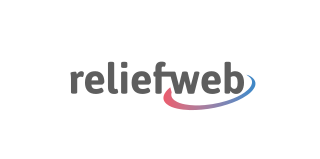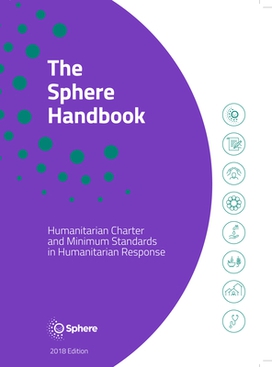CARE is a major international humanitarian agency delivering emergency relief and long-term international development projects. Founded in 1945, CARE is nonsectarian, impartial, and non-governmental. It is one of the largest and oldest humanitarian aid organizations focused on fighting global poverty. In 2019, CARE reported working in 104 countries, supporting 1,349 poverty-fighting projects and humanitarian aid projects, and reaching over 92.3 million people directly and 433.3 million people indirectly.

An internally displaced person (IDP) is someone who is forced to leave their home but who remains within their country's borders. They are often referred to as refugees, although they do not fall within the legal definitions of a refugee.

Humanitarian aid is material and logistic assistance to people who need help. It is usually short-term help until the long-term help by the government and other institutions replaces it. Among the people in need are the homeless, refugees, and victims of natural disasters, wars, and famines. Humanitarian relief efforts are provided for humanitarian purposes and include natural disasters and human-made disasters. The primary objective of humanitarian aid is to save lives, alleviate suffering, and maintain human dignity. It may, therefore, be distinguished from development aid, which seeks to address the underlying socioeconomic factors which may have led to a crisis or emergency. There is a debate on linking humanitarian aid and development efforts, which was reinforced by the World Humanitarian Summit in 2016. However, the conflation is viewed critically by practitioners.

The United Nations Institute for Training and Research (UNITAR) is a dedicated training arm of the United Nations system. UNITAR provides training and capacity development activities to assist mainly developing countries with special attention to Least Developed Countries (LDCs), Small Island Developing States (SIDS) and other groups and communities who are most vulnerable, including those in conflict situations.

The Directorate-General for European Civil Protection and Humanitarian Aid Operations, formerly known as the European Community Humanitarian Aid Office, is the European Commission's department for overseas humanitarian aid and for civil protection. It aims to save and preserve life, prevent and alleviate human suffering and safeguard the integrity and dignity of populations affected by natural disasters and man-made crises. Since September 2019, Janez Lenarčič is serving as Commissioner for Crisis Management in the Von der Leyen Commission, and since 1 March 2023, Maciej Popowski leads the organisation as the Director-General.

A humanitarian crisis is defined as a singular event or a series of events that are threatening in terms of health, safety or well-being of a community or large group of people. It may be an internal or external conflict and usually occurs throughout a large land area. Local, national and international responses are necessary in such events.

Medair is an international non-governmental organisation (INGO) whose purpose is to relieve human suffering in some of the world's most remote and devastated places. Medair aims to assist people affected by natural disasters and conflict to recover with dignity through the delivery of quality humanitarian aid.
The Steering Committee for Humanitarian Response (SCHR) is an alliance made up of chief executive officers representing nine humanitarian networks or agencies.

ReliefWeb (RW) is a humanitarian information portal founded in 1996. As of July 2023, it hosts more than one million humanitarian situation reports, press releases, evaluations, guidelines, assessments, maps and infographics. The portal is an independent vehicle of information, designed specifically to assist the international humanitarian community in effective delivery of emergency assistance or relief. It provides information as humanitarian crises unfold, while emphasizing the coverage of "forgotten emergencies" at the same time.
Sphere is a global movement started in 1997 aiming to improve the quality of humanitarian assistance. The Sphere standards are the most commonly used and most widely known set of core humanitarian standards. Sphere's flagship publication is the Sphere Handbook.

Humanitarian Accountability Partnership International, established in 2003, was the humanitarian sector's first international self-regulatory body. A multi-agency initiative working to improve the accountability of humanitarian action to people affected by disasters and other crises, HAP members ranged from organisations with a mandate for emergency relief and development activities to institutional donors. The organisation aimed to strengthen accountability towards those affected by crisis situations and to facilitate improved performance within the humanitarian sector. The ultimate goal of the organisation was to uphold the rights and the dignity of crisis-affected populations across the world.
People In Aid was an international, not-for-profit membership organisation with offices in the UK, Australia and East Africa. People In Aid no longer exists following its merger with HAP International on 9 June 2015 to form the CHS Alliance.
RedR is an international NGO whose stated mission is to “rebuild lives in times of disaster by training, supporting, and providing aid workers to relief programmes across the world.” It was originally an acronym for Register of Engineers for Disaster Relief, although it is no longer used as such.
The Emergency Capacity Building Project is a collaborative capacity-building project aimed at improving the speed, effectiveness and delivery of humanitarian response programs. The ECB Project is a partnership between seven non-governmental organizations (NGOs), and implements programs in one region and four countries known as consortia.
Internews Europe is an international development organisation founded in 1995 that specialises in media development which includes supporting independent media and free information flows in fragile states, emerging democracies and some of the world’s poorest countries. In doing so, it tries to promote good governance, human rights, effective response to humanitarian crises and access to information on critical issues such as the environment and climate change.
The Shelter Cluster is an Inter-Agency Standing Committee (IASC) coordination mechanism that supports people affected by disasters and conflicts with the means to live in safe, dignified and appropriate shelter. The Shelter Cluster is one of eleven sectorial coordination groups that are part of the Cluster Approach, that followed the Humanitarian Response Review in 2005. Currently 43 humanitarian organizations are part of the Shelter Cluster at global level, more than 500 organizations coordinate shelter assistance with the support of the Shelter Cluster at country level.

Sir Mark Andrew Lowcock is a British economist and accountant who served as the United Nations Under-Secretary-General for Humanitarian Affairs and Emergency Relief Coordinator between 2017 and 2021. Prior to his appointment by United Nations Secretary-General António Guterres on 12 May 2017, Lowcock was the Permanent Secretary of the Department for International Development (DFID) from June 2011 to September 2017. He is currently a visiting professor in practice at the Department of International Development at the London School of Economics and Distinguished Non-Resident Fellow at the Center for Global Development in Washington, DC. He is also a Trustee/Director and vice-chair of The Howard Partnership Trust, a multi-academy trust of schools in Surrey.
ACAPS is a non-profit, non-governmental project that provides international, independent humanitarian analysis. Founded in 2009, ACAPS provides daily monitoring and analysis of the situations in 150 countries, to support humanitarian aid workers. This analysis is freely provided to the NGOs, UN agencies and donors. ACAPS is also known for having developed a severity ranking of humanitarian crises. It employs around 30 professionals based in Geneva.

The CALP Network is an organisation originating in 2005 and officially launched in 2009 as The Cash Learning Partnership, with the objectives of increasing the scale and quality of Cash and Voucher Assistance (CVA) employed by humanitarian agencies around the world to deliver aid. CVA encompasses aid delivered as cash, or vouchers exchangeable for goods and services, directly to recipients, and represents an increasingly significant aid modality amounting to 17.9% of total international humanitarian assistance expenditure in 2019. CALP works to build CVA capacity within aid organisations, especially by providing training and e-learning; coordinates the use of CVA by agencies; compiles and shares knowledge and research; and contributes to the development of policy environments encompassing CVA.

The Sphere Handbook: Humanitarian Charter and Minimum Standards in Humanitarian Response often called the Sphere Standards is a textbook of minimum standards in humanitarian aid published by the Sphere Association.










